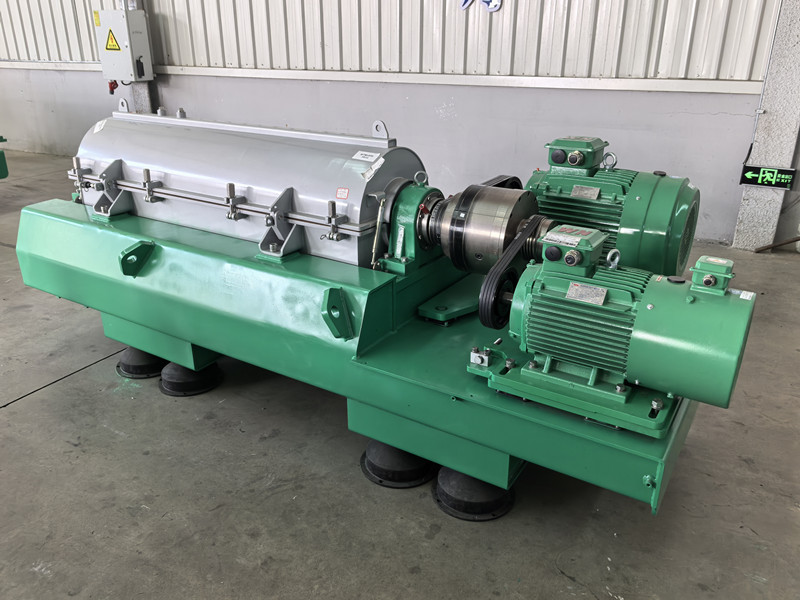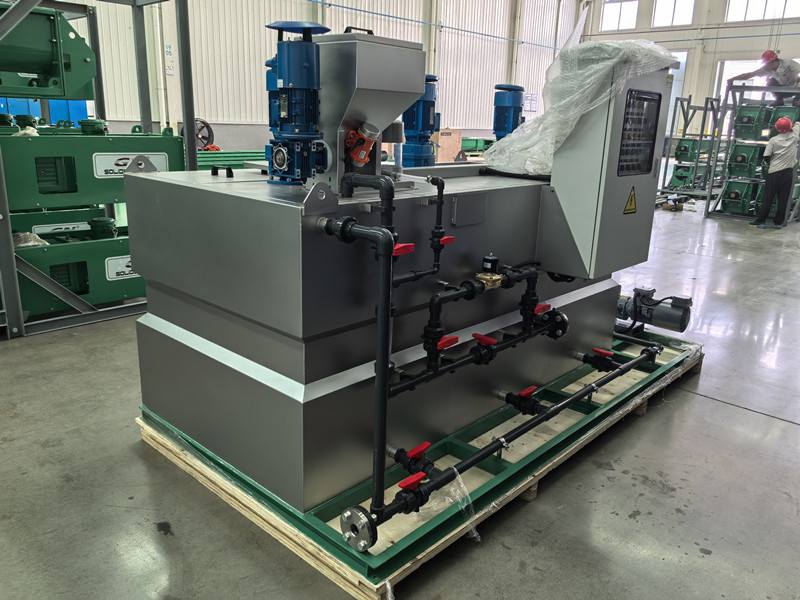GNLW364 Decanter Centrifuge for Overseas Sludge Dewatering Project
This week, GN Separation has successful assembled one set of sludge dewatering system destined for an overseas client in the environmental engineering sector. The order, comprising a core GNLW364 Dewatering Centrifuge and a complementary 3000L Automatic Polymer Dosing Unit (Model GNSJY3000).

Key Features of the GNLW364 Dewatering Centrifuge
The GNLW364 dewatering centrifuge is engineered to optimize sludge dewatering performance across industrial and municipal applications. Its core advantages include:
1. High-Speed Separation & Efficiency
Equipped with a variable-frequency drive (VFD), the centrifuge achieves rotational speeds of up to 3,900 RPM, generating centrifugal forces exceeding 3,000 G. This enables rapid separation of solid and liquid phases, reducing moisture content in sludge cakes depending on feed characteristics. The machine’s 360mm bowl diameter and 1,420mm length provide a large sedimentation area, enhancing considerable capacity.
2. Durable Construction & Adaptability
The centrifuge’s bowl and scroll conveyor are centrifugal casted from duplex stainless steel (2205), ensuring corrosion resistance in harsh environments. Easy wearing parts like slurry distribution port, scroll blade and solids discharge port are protected by using tungsten carbide plates or bushing greatly extend the service life of the machine. Additionally, the machine’s compact footprint simplifies integration into existing treatment facilities.
3. Smart Automation & Safety
The GNLW364 features a PLC-based control system with real-time monitoring of vibration, temperature, and torque. Automatic shutdown protocols activate in the event of overload or imbalance, minimizing downtime. An integrated back-drive system further enhances safety during maintenance by allowing manual rotation of the bowl.

Synergistic Performance: Polymer Dosing Unit (GNSJY3000) as a Critical Enabler
Effective sludge dewatering relies not only on mechanical separation but also on chemical conditioning to destabilize colloidal particles and improve floc formation. The GNSJY3000 Polymer Dosing Unit plays a pivotal role in this process:
GNSJY3000 polymer dosing unit automates the three-stage process of polymer activation: dry powder feeding, wetting, and aging. Its vertical tank design reduces sedimentation risks, while a built-in stirrer maintains polymer homogeneity. Its low-energy consumption makes it suitable for prolonged operation.
Integrated System Benefits: Cost Savings & Environmental Compliance
When paired, the GNLW364 and GNSJY3000 deliver a synergistic effect that transcends individual capabilities:
• Reduced Chemical Usage: Precise polymer dosing minimizes overconsumption, lowering operational costs compared to manual systems.
• Enhanced Cake Quality: Properly conditioned sludge forms denser, more uniform cakes, reducing disposal volumes and associated fees.
• Lower Energy Costs: The centrifuge’s VFD adjusts power output to match feed rates, while the dosing unit’s efficient mixing reduces polymer waste.
• Compliance with Regulations: By achieving higher dryness levels, the system helps clients meet stringent discharge standards for water reuse or landfill applications.
Global Reach, Local Impact
GN Separation’s export of this system reflects its growing footprint in international markets, particularly in regions grappling with urbanization and industrial waste challenges. The company’s strategy of combining robust hardware with intelligent automation has resonated with clients seeking scalable, low-maintenance solutions.








